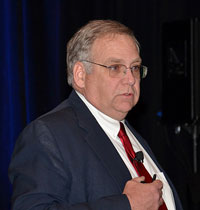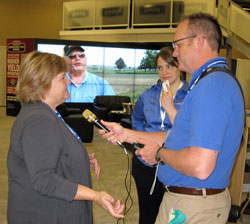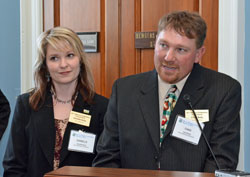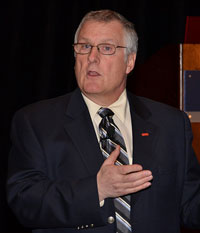 We’re starting a new series here on AgWired to tell you more about the people behind the products at BASF Crop Protection. Our first BASF Personality Profile features Neil Bentley, Director of Marketing for BASF’s U.S. crop business.
We’re starting a new series here on AgWired to tell you more about the people behind the products at BASF Crop Protection. Our first BASF Personality Profile features Neil Bentley, Director of Marketing for BASF’s U.S. crop business.
Neil started his career in retail agriculture in northwest Illinois and became a sales rep for BASF and American Cyanamid (dating yourself there, Neil!). After spending several years with the BASF marketing team at headquarters in North Carolina, in 2008 Neil took an assignment as a global marketing manager for BASF in Germany. “I had the chance as a global marketing manager to see a lot of agriculture around the world,” said Neil. “It was interesting to see the diversity of agriculture, the practices, and how we can help farmers get the most from every acre.”
 Neil and his family enjoyed their time in Germany, but he’s happy to be back in the United States now and working with the growers here to help them improve their efficiency and productivity. “We really want to make sure that we continue to work with farmers, to help bring the solutions that we can create in a way that’s very meaningful to them,” he said.
Neil and his family enjoyed their time in Germany, but he’s happy to be back in the United States now and working with the growers here to help them improve their efficiency and productivity. “We really want to make sure that we continue to work with farmers, to help bring the solutions that we can create in a way that’s very meaningful to them,” he said.
One way they are doing that is offering incentives to help growers manage risk. “We call it our Advantage Suite of offers,” Neil said. “What it really starts with is making the right selections of the right products to maximize the yield on the acre.” Once the grower makes the decision to use BASF products for yield advantage, Neil says they offer other advantages. “We have offers such as Finance Advantage, which is a way growers can purchase our products and have zero interest financing until December,” he said. “We have a very innovative tool called Investment Advantage, in which if a grower purchases our high yield packages, BASF is willing to participate in the risk of the market.”
Investment Advantage has a March 15 deadline, but there is still time to participate in BASF’s other offers. Information on all BASF Grower Advantage offers is available at growersadvantage.basf.us.
Learn more about Neil and his dedication to helping farmers get the most from every acre in this interview: BASF Director of Marketing Neil Bentley
 This is the speed limit for the 8-mile stretch of highway that runs in front of our house. There are very few miles of road left in Nebraska with a 55 mph speed limit and unfortunately, there’s one out front of our house. I’d hate to count how many people have been pulled over for speeding in my grandparents’ driveway, me included.
This is the speed limit for the 8-mile stretch of highway that runs in front of our house. There are very few miles of road left in Nebraska with a 55 mph speed limit and unfortunately, there’s one out front of our house. I’d hate to count how many people have been pulled over for speeding in my grandparents’ driveway, me included. 
 He told other swine vets at the
He told other swine vets at the  The amendments include one by Senator Jeff Merkley (D-OR) which will exempt drivers of farm vehicles from having to acquire a commercial driver’s license, and another by Senator Amy Klobuchar (D-MN) which will waive hours of service restrictions during harvest seasons.
The amendments include one by Senator Jeff Merkley (D-OR) which will exempt drivers of farm vehicles from having to acquire a commercial driver’s license, and another by Senator Amy Klobuchar (D-MN) which will waive hours of service restrictions during harvest seasons.
 We’re starting a new series here on AgWired to tell you more about the people behind the products at
We’re starting a new series here on AgWired to tell you more about the people behind the products at  Neil and his family enjoyed their time in Germany, but he’s happy to be back in the United States now and working with the growers here to help them improve their efficiency and productivity. “We really want to make sure that we continue to work with farmers, to help bring the solutions that we can create in a way that’s very meaningful to them,” he said.
Neil and his family enjoyed their time in Germany, but he’s happy to be back in the United States now and working with the growers here to help them improve their efficiency and productivity. “We really want to make sure that we continue to work with farmers, to help bring the solutions that we can create in a way that’s very meaningful to them,” he said. 


 That expansion has brought with it both opportunities and challenges for producers, according to Iowa State University Professor of Animal Science Dr. John Patience, who spoke to swine veterinarians last week at the
That expansion has brought with it both opportunities and challenges for producers, according to Iowa State University Professor of Animal Science Dr. John Patience, who spoke to swine veterinarians last week at the 